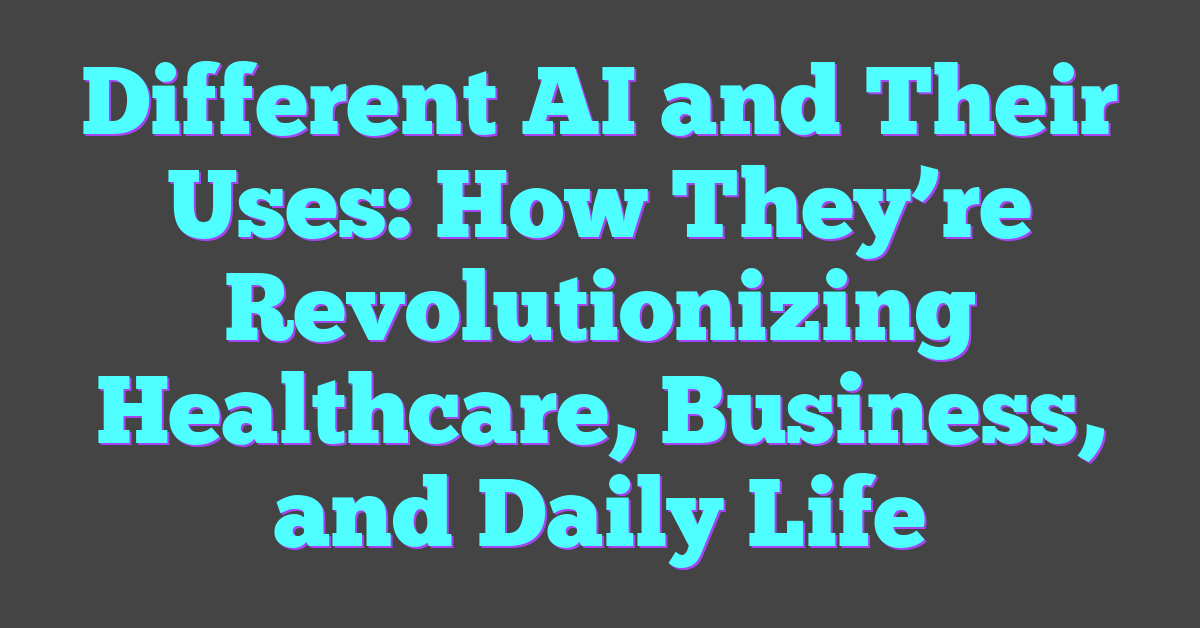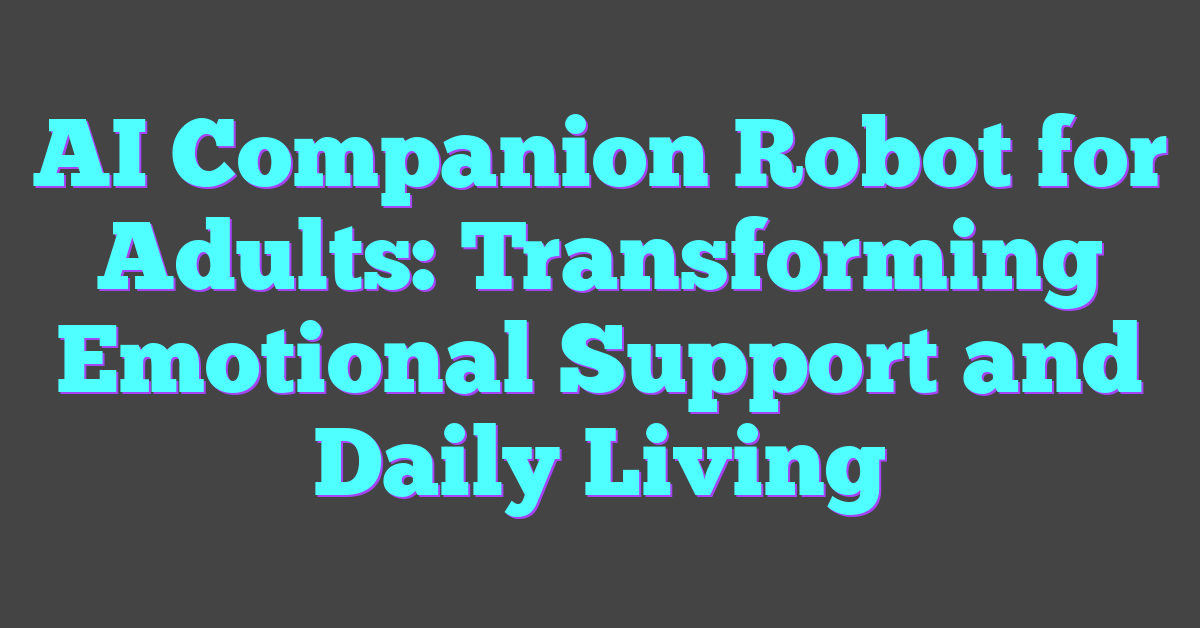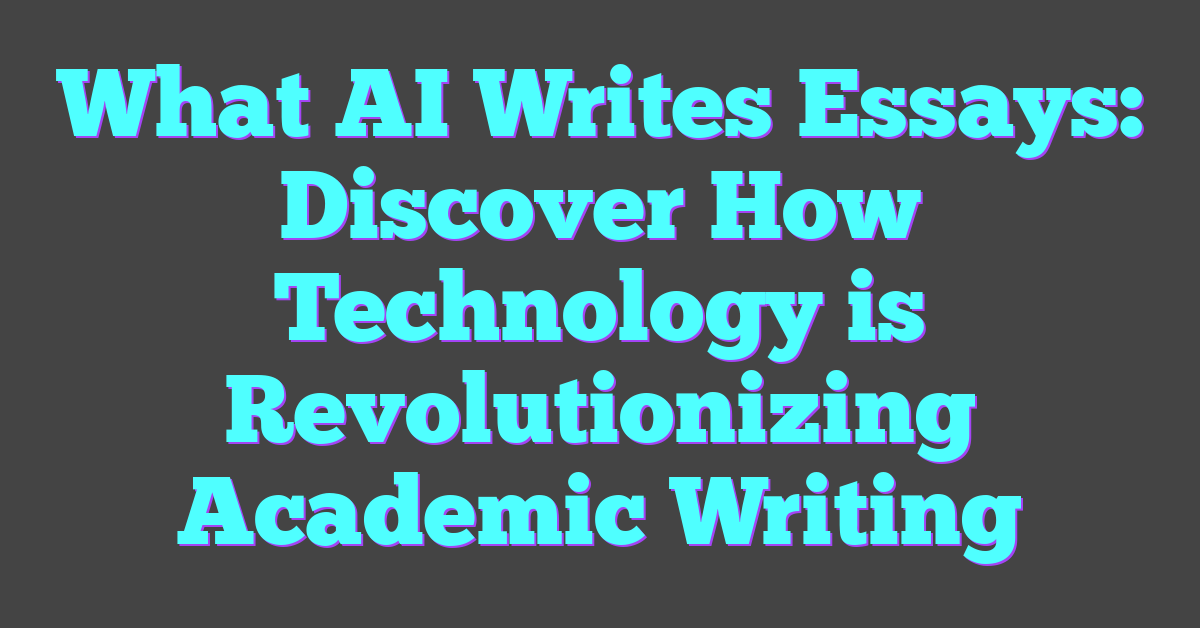Artificial intelligence is no longer a concept confined to science fiction. From virtual assistants like Siri and Alexa to sophisticated algorithms driving self-driving cars, AI is transforming the way we live and work. It’s fascinating to see how these intelligent systems are seamlessly integrating into our daily routines, making tasks easier and more efficient.
But AI isn’t just about convenience. In healthcare, AI-powered tools are diagnosing diseases with incredible accuracy. In finance, algorithms predict market trends, helping investors make smarter decisions. This article explores the diverse applications of AI, highlighting how it’s revolutionizing various industries and shaping the future.
Overview of Different AI Technologies
Artificial intelligence (AI) encompasses many technologies that are becoming integral to various industries. Continuing from the significant roles of AI in healthcare and finance, we’ll now delve into the core types and advancements in AI technologies shaping the world today.

Defining AI and Its Core Types
AI aims to create machines that can perform tasks requiring human intelligence. Core types of AI include:
- Narrow AI: Also known as Weak AI, this type specializes in a single task. For example, virtual assistants like Siri and Alexa answer questions and perform specific functions.
- General AI: Artificial General Intelligence (AGI) possesses the capability to understand, learn, and apply intelligence across various tasks. AGI remains theoretical but would function similarly to human intelligence.
- Superintelligent AI: This is a hypothetical form of AI that surpasses human intelligence. It’s still within the realm of speculation and ongoing research.
Advancements in AI Technologies
Recent advancements in AI have notably impacted various sectors. Three prominent areas include:
- Natural Language Processing (NLP): NLP technologies, such as Google’s BERT, enhance the understanding of human language. They power chatbots, translators, and voice-activated assistants.
- Computer Vision: With advancements in image recognition and analysis, computer vision enables applications like facial recognition, medical imaging diagnostics, and autonomous driving.
- Machine Learning and Deep Learning: These subsets of AI use algorithms to identify patterns and make decisions. Advances in neural networks, typified by models like GPT-3, have significantly enhanced capabilities in data processing and predictive analytics.
By understanding these AI technologies and their advancements, one can appreciate their transformative effects across multiple domains.
AI in Daily Life
AI is now an integral part of daily routines, from home automation to personal assistance. This section will explore how AI enhances everyday experiences with practical applications.
Smart Home Devices
Smart home devices, powered by AI, offer convenience and energy efficiency. These devices include smart thermostats, lighting systems, and security cameras. Smart thermostats like Nest Learning Thermostat adjust temperatures based on occupants’ behavior and preferences, reducing energy consumption. AI-driven lighting systems, such as Philips Hue, adapt lighting based on natural light availability and user activity. Security cameras with AI, such as Ring, provide real-time alerts and recognize faces for enhanced safety.
Personal Assistants and Chatbots
Personal assistants and chatbots streamline tasks, offering personalized user experiences. Intelligent assistants like Siri, Alexa, and Google Assistant perform tasks ranging from setting reminders to controlling smart home devices using voice commands. Chatbots, integrated into customer service platforms like Zendesk or Intercom, handle customer inquiries, provide support, and improve response times. These AI applications enhance productivity and offer seamless interactions.
AI in Business and Industry
AI transforms various sectors within business and industry. Its applications enhance efficiency, decision-making, and innovation.
Automation in Manufacturing
AI optimizes manufacturing through automation. Robots, powered by AI algorithms, perform repetitive tasks and reduce human error. AI-driven machines in factories assemble products, monitor quality, and even predict maintenance needs. This predictive maintenance reduces downtime, thereby increasing productivity and saving costs. Additionally, AI technologies like Computer Vision detect defects in production lines, ensuring high-quality outputs.
AI in Data Analysis and Decision-Making
AI enables data analysis and decision-making with precision. Businesses use AI-driven tools to analyze large datasets, uncover patterns, and generate insights. These insights inform strategic decisions, driving growth and competitiveness. For example, predictive analytics helps forecast market trends and consumer behavior. AI algorithms in finance detect fraud by analyzing transaction patterns1. In retail, AI recommends products to customers based on their browsing history, enhancing user experience and boosting sales.
AI in Healthcare
AI has revolutionized healthcare, significantly enhancing patient outcomes and improving diagnostic accuracy. Let’s explore two critical areas where AI is making a substantial impact.
Robotic Surgeries and Diagnostics
AI-powered robotic surgeries offer precision that human surgeons can’t match. Robots assist in complex procedures, resulting in fewer complications and faster recovery times. For example, the Da Vinci Surgical System utilizes AI to provide surgeons with enhanced control, reducing errors and improving patient safety. Furthermore, AI in diagnostics aids in early disease detection. Algorithms analyze medical images to detect anomalies that might be missed by human eyes. For instance, AI systems can identify early signs of conditions like cancer or diabetic retinopathy from imaging data with remarkable accuracy.
Customized Patient Management Systems
AI-enabled patient management systems personalize treatment plans based on individual medical histories and current health data. These systems adapt to patient needs, optimizing treatment regimens and improving adherence. For example, IBM’s Watson Health uses AI to analyze vast amounts of clinical data, assisting healthcare providers in creating tailored treatment protocols. Additionally, AI-driven platforms can predict patient outcomes, enabling proactive care. Predictive analytics monitor patient vitals and history, alerting healthcare providers to potential issues before they escalate. This not only enhances patient care but also reduces healthcare costs by preventing severe complications.
Ethical Considerations and Challenges of AI
As AI integrates deeper into our lives and industries, it’s important to understand the ethical considerations and challenges. Addressing these concerns ensures responsible development and deployment of AI technologies.
Privacy and Security Issues
AI systems collect and analyze vast amounts of personal data, making privacy and security crucial concerns. Organizations using AI must implement robust data protection protocols to prevent breaches and misuse. Examples include anonymizing datasets and encrypting communications. Additionally, there’s a need for clear regulations on data ownership and consent, ensuring individuals’ privacy rights are respected and maintained.
Impact on Employment
AI’s automation capabilities can significantly impact employment across various sectors. While some jobs may become obsolete, new opportunities also arise in AI development, maintenance, and oversight. Workers in repetitive task roles (e.g., assembly line workers, data entry clerks) may face displacement. Conversely, roles requiring AI knowledge and technical skills (e.g., AI specialists, data scientists) will see increased demand. Continuous learning and skill adaptation are essential for the workforce to transition seamlessly in an AI-driven world.
Conclusion
AI’s transformative potential is undeniable, touching almost every aspect of our lives. From healthcare innovations to business efficiencies, it’s clear that AI is here to stay. However, embracing this technology means also tackling its ethical challenges head-on. Privacy, security, and job market shifts are critical issues that need thoughtful consideration. As AI continues to evolve, fostering a balance between technological advancement and ethical responsibility will be key. By doing so, society can harness the full benefits of AI while mitigating its risks.
Frequently Asked Questions
What is AI and how has it evolved?
AI, or artificial intelligence, refers to the simulation of human intelligence in machines. It has evolved from simple problem-solving programs to sophisticated systems capable of learning, reasoning, and adapting.
How is AI used in daily life?
AI is used in daily life through applications such as virtual assistants, recommendation systems, autonomous vehicles, and smart home devices, making tasks easier and more efficient.
What are the benefits of AI in healthcare?
AI enhances precision in diagnostics, supports early disease detection, and helps create personalized treatment plans, significantly improving patient outcomes and reducing healthcare costs.
How does AI impact businesses?
AI streamlines processes, reduces operational costs, and boosts efficiency in businesses. It aids in data analysis, customer service automation, and predictive maintenance, enhancing overall productivity.
What are the ethical considerations of AI?
Ethical considerations of AI include privacy, security, data protection, and the potential misuse of AI technologies. Addressing these concerns is crucial for responsible AI development and implementation.
How does AI affect employment?
AI impacts employment by automating routine tasks, potentially displacing some jobs while creating new opportunities in AI-related fields. Workers may need to reskill to adapt to these changes.
Why is data protection important in AI?
Data protection ensures that personal information is safeguarded against misuse and breaches. It is essential for maintaining trust and compliance with legal standards while using AI technologies.
What challenges does AI pose in terms of privacy?
AI can infringe on privacy by collecting, analyzing, and storing vast amounts of personal data. Ensuring proper data handling and regulatory compliance is necessary to mitigate these risks.
How can we address the job market shifts due to AI?
Addressing job market shifts involves investing in education and training programs to equip the workforce with AI-related skills and fostering an environment that encourages continuous learning and innovation.
What is the future of AI in various sectors?
The future of AI includes further integration into everyday life, healthcare advances, business process optimization, and tackling complex global challenges, provided ethical and security concerns are effectively managed.




